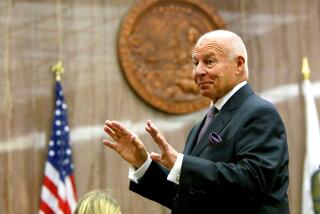Judge Bows Out, Cites Old Ties to Silberman
- Share via
U. S. District Judge John S. Rhoades on Monday removed himself from the money-laundering case of Richard T. Silberman, several hours after revealing in court that he had represented Silberman in lawsuits and may have donated money to the political campaign of Silberman’s wife, San Diego County Supervisor Susan Golding.
The case has been reassigned to U. S. District Judge J. Lawrence Irving.
Rhoades said at a hearing Monday morning that he had no plans to step down and felt “comfortable” staying on the case. However, he changed his mind Monday afternoon and informed lawyers in the case that it will be transferred. Rhoades is expected to issue a written order on the matter today.
Silberman, a powerful political fund-raiser and former top aide to Gov. Edmund G. Brown Jr., was arraigned Friday, along with the three alleged accomplices, on two charges of laundering $300,000 in funds portrayed to him by an undercover FBI agent as profits from Colombian cocaine trafficking.
They also are charged with one count of conspiring to launder money and avoid federal laws requiring the reporting of transactions involving cash sums of $10,000 or more. The alleged accomplices are Chris Petti of San Diego and Darryl Nakatsuka and Jack Norman Myers of Los Angeles. All but Petti are free on bond.
Case Continued
The four appeared before Rhoades for the first time Monday morning for the first of what are likely to be numerous pretrial sessions. The case was continued for a week because only Petti has retained a lawyer, Oscar Goodman of Las Vegas. Silberman was represented at the hearing by San Diego lawyer Milton J. Silverman, who said later that no decision has been made regarding whether he will continue to represent Silberman.
Later in the day, Rhoades approved a request that the Federal Defenders Office be appointed to represent Nakatsuka, who allegedly was a courier in the money-laundering scheme.
When the hearing began Monday morning, Rhoades said that, in “about 1960,” while he was in private practice, he represented Silberman and another man in a zoning variation case involving the city of San Diego. He said he represented Silberman again in 1973 or 1974 in a civil case in which Silberman and several others were defendants. That case was closed and settled in 1975, Rhoades said.
“I was at (Silberman’s) house, as were many others, for something concerned with politics in the 1970s,” Rhoades added. “And my wife and I may have, I’m not sure, made a small political contribution to (Golding’s) campaign.”
Rhoades had said early Monday that the lawyers could file motions asking him to remove himself from the case. “I, of course, will make my own individual determination as to whether I should or should not recuse myself,” he said.
Assistant U. S. Atty. Charles Gorder, who is prosecuting the case, said later that the situation is unusual and that he had planned to consult with his superiors in the Justice Department about whether to file a motion asking Rhoades to step down.
More to Read
Sign up for Essential California
The most important California stories and recommendations in your inbox every morning.
You may occasionally receive promotional content from the Los Angeles Times.










